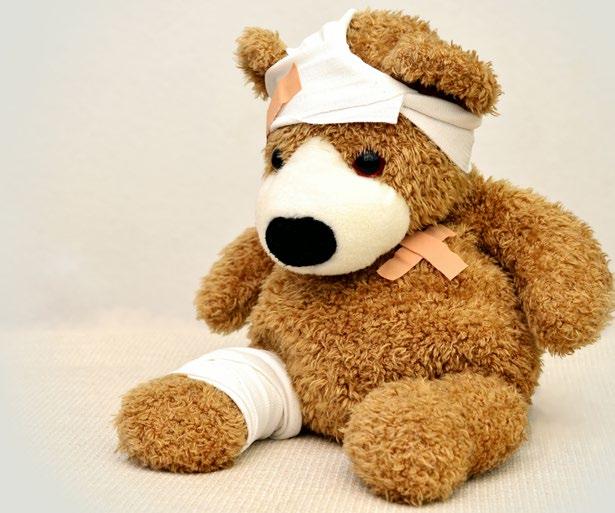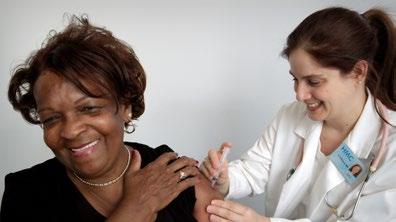
6 minute read
Fact File: medical scheme membership Q&A
Q&A: Medical scheme membership
A MEDICAL scheme is a non-profit entity controlled by a board of trustees. However, the administration of the scheme is undertaken by a profit-making private company, and it is here that conflicts of interest may arise between members of a scheme and shareholders of its administration company.
Advertisement
For this reason, medical schemes are tightly regulated: they are governed by the Medical Schemes Act and regulation is enforced by the Council for Medical Schemes (CMS), which falls under the Department of Health.
The following Q&A on medical scheme membership is an edited version of information available on the CMS website:
Is membership of a medical scheme available to anyone?
Yes, the open enrolment principle means that you can join any medical scheme of your choice. The exception is membership of restricted schemes, which have been established exclusively for members/staff of a particular employer, profession, trade, industry, calling, association or union.
Can I belong to more than one medical scheme at the same time?
No. You must ensure that your membership of a scheme is cancelled before enrolling with a new scheme.
Can a minor be a member?
A child can be registered as a dependant of a member or, if his or her parents are not members, as a principal member, provided that the relevant contributions are paid on his or her behalf.
FACT FILE
May a medical scheme refuse to admit my dependant?
No. A scheme may not refuse admission if the dependant meets the eligibility criteria stated in the rules of the scheme. In terms of the Act, dependants are:
• Your spouse or life partner
• Dependent children
• Other members of your immediate family for whom you are liable for care and support; or
• Any other person who is allowed as a dependant under the rules of the scheme.
A child under the age of 21 is a child dependant; a child over 21 is an adult dependant.
Physically or mentally disabled people can be registered as child dependants if it is allowed in the rules of the particular scheme. If not, they can be registered as adult dependants.
A third-generation dependant is the grandchild of the principal member. Most schemes allow these dependants to be added only if the grandparents have legally adopted the child or where a court of law has awarded guardianship to them.
If I die, will my registered dependants still be covered?
Yes, without any break in membership and provided contributions are paid. Such members are referred to as continuation members, and one of the dependants (usually the surviving spouse) will become the principal member. In the case of restricted medical schemes, no additional dependants will be allowed. For example, if the surviving spouse remarries, the new partner would not be eligible for membership.
Go to www.medicalschemes.com for more information about the Council for Medical Schemes and its functions.
MONEY BASICS with MARTIN HESSE
Types of cover for sickness and injury
I RECENTLY received an email from a highly stressed reader. Her daughter needed an operation and to have a prosthesis fitted. The quote for the daughter’s six-day hospital stay plus specialists’ bills plus the prosthesis was R330000 (the prosthesis on its own was almost half of that). The “medical aid scheme” the reader belonged to was prepared to pay only R77000, leaving an out-of-pocket shortfall of R253000.
When I investigated, I discovered it was not a medical scheme at all; it was short-term health insurance, which is a much more basic type of cover. The trouble was, the health insurance was dressed up to look like medical-scheme cover on the website. Unless you went to the bottom of the webpage, where it states “This is not a medical aid scheme”, you would be hard pressed to tell the difference between that site and a medical scheme site.
It is vitally important, when you buy any type of insurance, to know exactly what you are insured for.
This applies especially to health cover, because there is a range of products out there, which provide very different types of cover and which apply under different circumstances.
MEDICAL SCHEME COVER
This is the most comprehensive medical cover you can get, even if you are on a budget-level plan. Medical schemes fall under their own separate piece of legislation, the Medical Schemes Act, which requires a high level of consumer protection. The most important features of medical schemes are:
• An open scheme (one that is not restricted to a certain worker group) cannot refuse you membership, even if you are sick and/or old. However, the scheme can impose a waiting period (a fixed initial period of, for example, six months, during which it will not pay claims) and higher premiums in the form of what are known as late-joiner penalties for people who join later in life and have not had medical scheme cover previously.
• The scheme must provide full cover for medical emergencies and a list of life-threatening conditions, known as the prescribed minimum benefits (PMBs), even on its lowest plans. (See article on page 10).
• A medical scheme cannot arbitrarily cancel your membership if you are deemed high-risk. Only if you fail to pay your premiums may a scheme stop covering you.
Note that even if you are on one of its top plans, the cover your medical scheme provides is likely to fall short, especially when it comes to paying specialists’ bills. Specialists may charge three or four times the rates set by the scheme for treatments and consultations.
GAP COVER
This is short-term insurance (governed by the Short-term Insurance Act), that provides “top-up” cover for specialists during hospital admissions. If a specialist charges, for example, R8 000, but the scheme covers only R4 000, the gap cover policy will pay for the outstanding R4 000. Gap cover is subject to an overall annual limit of R157000 per individual. These policies are generally relatively affordable, at only a few hundred rand per month per family. (See article on gap cover on page 16).
HEALTH INSURANCE
This is cover provided by insurance companies for hospitalisation, typically offering a fixed rate per day in hospital, and/or for primary-care expenses such as GP consultations, prescribed medication, basic dentistry and some optometry at designated service providers. It is a very poor substitute for medical scheme cover.
Unlike medical schemes, insurers offering this (and gap cover outlined above) may refuse to cover you if you are already sick or if you are over a certain age. If you do have cover and claim too often, they can cancel your cover, leaving you stranded. Their websites may entice you into thinking their offerings are as good as medical scheme cover but at a far lower rate.
But you get what you pay for, or, should I say, you don’t get what you don’t pay for. When it comes to operations and specialist treatments – if you want to be treated in a private and not a state hospital – this cover falls far short of the amount of money required, as outlined in my example in the opening paragraphs.
DREAD DISEASE COVER
This is a life insurance product, and often comes in a package along with life and disability cover. It pays out a lump sum, determined by you, with premiums set accordingly, if you are diagnosed with a so-called dread disease – typically cancer, stroke, and any heart-related disease. The severity of the disease determines the percentage of total cover paid out.
The money can be used for anything you like, but is aimed at non-medical expenses associated with contracting a dread disease, such as paying for extra help in the house.
Again, because it is insurance and not medical scheme cover, an insurer may refuse to cover you if you are already sick, or exclude your particular illness from your cover, or impose a higher premium.
Like all life insurance products, the older you are when you take out the cover, the higher your premiums will be.

treatments and consultations.





